DMC: Devil May Cry comes to us from developer Ninja Theory, who are best known for their games Heavenly Sword and Enslaved: Odyssey to the West. Up until this point, each Devil May Cry game has been developed in house at Capcom, so it was a bit of a shock when it was announced that DMC would be created by an outside developer. Of course, the biggest shock regarding the new game came from fans who were upset at Dante's new look: mostly his hair being a different length and color. Then there was, and still is, some confusion as to whether this was a prequel to Devil May Cry 3 or a reboot of the entire series. After playing it, I can safely say that this is a mash-up of a both a prequel and a reboot. Capcom and Ninja Theory seemed to approach this very carefully, crafting a game that could function as a prequel if it didn't sell and no sequels would be made, or as a reboot if the game was a hit; that's a little confusing, but it works.
Speaking of things that work: I'll be damned if DMC: Devil May Cry doesn't have the best combat system of any game in the series, and one of the best for action games as a whole. Ninja Theory really managed to add a lot of depth to a rather simplistic system making combat both engaging and fun, as well as very fluid and fast paced. Dante has three move sets, each of which can be switched to on the fly with the simple press of a button. The normal move set has Dante's guns and sword; the demonic set has demon weapons as well as a whip that pulls enemies towards you; and the angelic set has angel weapons and a whip that pulls you towards an enemy. There are two demonic and two angelic weapons in the game. You can only have one of these weapons active at a time for each set, but you can easily swap between weapons in a set using the D-pad.
Unlike the weapons in previous entries, or most action games for that matter, the weapons in DMC: Devil May Cry are very balanced: each has their strengths and weaknesses as well as proper and improper uses. No one weapon is the end-all-be-all choice for any situation. This requires the player to constantly change weapons and attack styles in order to succeed, which in turn adds to your overall style rating that translates into earning more red orbs (currency) or white orbs (experience points) at the end of the level.
DMC seems like a much more casual experience than the previous games: though I see this as a good thing. The older games were often too complex for their own good, which could easily frustrate players who didn't want to memorize a lot of intricate combos, but simply wanted to enjoy the game; sure, there was the automatic mode that allowed button mashers the opportunity of performing stylish and complex moves with minimal input, but this could get dull rather quickly. However, Ninja Theory seems to have come up with a nice balance that makes DMC a game that is easy to learn, but difficult to master. The combos have been greatly simplified so they are easy to remember and each weapon has the same sequence of button presses that do similar attacks. Here, the depth of the combat system comes from switching between weapons quickly and constantly, rather than entering long strings of perfectly timed button presses.
Aesthetically, DMC is a toss up. On one hand, the levels look fantastic, especially when in you're in combat or in motion. Each level takes place in limbo which is depicted as a sort of warped reflection of the real world. Here, DMC makes great use of stylization through camera angles, screen filters, and the presence of graffiti on many of the walls. My favorite stylization choice however, is the use of large white text appearing on the ground and walls that give the player subtle hints about what to do or where to go, as well as setting the tone for an upcoming section or simply taunting/insulting Dante. The text is accompanied by a disembodied demonic voice that reads the text aloud as it appears, making these messages all the more prominent. Later in the game, Dante gains the "Devil Trigger" ability which allows him to become very fast and very powerful for a short period of time. During these instances the aesthetics of the level warp to a palette that consists only of various shades of black, white, and red: which I rather like. Each of these aspects that make DMC a great game in terms of style and playability are brought to a mirror sheen with a near perfect soundtrack made up of various forms of thrash/death metal and a good amount of techno and dubstep thrown in for good measure. These tracks always fit the given situation and serve to "pump you up" and keep you kicking ass.
On the other hand though, DMC drops the aesthetic ball with its cutscenes. The graphics present in these look very muddy and outdated with clipping and texture pop-in occurring very frequently. These problems certainly aren't deal breakers though, as it's clear the developers put more resources into the gameplay and less into the cutscenes, as they should; though, it can be rather jarring transitioning from gameplay to cutscene due to the heavy differences in style. Whereas the levels are highly stylized and colorful, the cutscenes are rather bland and earth toned. Most of the cutscenes take place in the real world so this could have been a design choice made by the developers who wanted the player to feel the foreboding atmosphere of an ordinary world that has an unseen, sinister entity casting a shadow over everything: however, it's more likely they just didn't have the time or resources to give the cutscenes some polish.
Another aspect of DMC that's a toss up relates to its narrative; the Devil May Cry series has always had a pretty weak storyline that has only served to bridge levels and games together, and DMC is no exception. However, one thing that has always been strong about the series' narrative is the characterization of Dante; he isn't the deepest character ever, but he is likable and very entertaining, which is surprising because he's kind of a womanizer and a cheese ball. In DMC we have a much younger and more brooding depiction of Dante whose only real goal in life is to get drunk, kill monsters, and bang loose women. This lifestyle is quickly flipped on its head when a strange woman appears before him and warns that he is being hunted. Before he even has time to think about the woman's warning, he is pulled into limbo and attacked by a group of demons.
Soon, Dante learns that the woman's true intentions are to bring him to her boss who is the leader of a terrorist organization called "The Order". Upon their meeting, The Order's leader introduces himself as Virgil, and states that he plans to save the world from a man named Kyle Ryder who is the human incarnation of the demon king Mundus. Virgil then explains that he and Dante are nephilim, creatures that are half demon, half angel, and that they are the only ones who can destroy a demon king.
This is more or less what DMC has for a narrative foundation; it's not really terrible, but it's certainly not groundbreaking either. What is problematic though is how the story is executed. For one, everything seems very isolated and inconsequential. We're told through several different conversations that Mundus' goal is to rule the world, but we're never given an explanation as to why he desires this other than "he's just a dick". This feeling of isolation is further perpetuated because there are only around seven characters in the game; three good, three evil, and one neutral. I think it was a great design choice to have each level take place in limbo, but this has the negative consequence of us barely seeing the people who populate the real world equivalent. This makes the city where everything takes place feel very empty and lifeless.
On the plus side though, DMC adds another layer of development to Dante's character. Right away you get a sense of who he is from the painful to watch opening sequence that shows him getting hammered in a strip club and then having sex with two women back at his place. The first time I saw this, I thought it was just a poor attempt to make the game seem edgy, but really it's a brilliant attempt to make the game seem cheesy. Let's face it, most action games/movies come with a heaping helping of cheese and the Devil May Cry series is no exception. Think back to all the cheesy one-liners from classic 80's action movies and you'll quickly see that Dante is the king of bad puns and one-liners. DMC has Dante saying such gems as "You're all mixed up" after he throws a succubus into a giant blender or "Who wants to be the biggest loser" when two large, fat demons attack. The thing about these lines is that they are so bad, and occur so frequently, that they actually become pretty funny after a while and go a long way towards establishing his character.
Like I touch on before, what makes DMC a good game lies in its gameplay and level design. For the most part, DMC is a linear experience with few branching paths. This isn't a bad thing in my opinion as it allows the game a sense of flow in regards to the action that a non-linear playstyle would interrupt. This allowed the developers to focus on stylization more than a non-linear game would allow and has lead to some very unique levels that do an exellent job of conveying a sense of disorientation that serves to make limbo a terrible, yet interesting, place. DMC also has some cool (though admittedly simplistic) boss battles; my favorite of which (other than the final boss) is the fight with the demonic form of Bob Barbas, the TV reporter.
There are a few slip ups that mar the otherwise flawless gameplay of DMC. For one, there isn't a huge variety of enemies for Dante to vanquish. The game makes up for this though by placing different types of enemies together and in different settings, so rarely did I get bored dispatching the same foes over and over again. Another thing that can be problematic is how long the loading screens are. Maybe it's just because I usually play the PC version of a game, and this was the PS3 version, but I had loading screens that lasted upwards of a minute, which seems way too long for a game that isn't all that graphically intensive. My biggest issue with the gameplay is that DMC has a bad habit of closing the path you came from behind you. To me, this is a poor design choice since it doesn't allow for the possibility of going back and exploring other directions in search of secret items that would aid in your completion rating at the end of the level. Quite often I would reach a branching path and decide to head one direction because I think it is the way to a secret, but then something would close behind me and I'd quickly realize that I should have taken the other path first. This isn't as big of a deal to me once I realized it was impossible to 100% the game on a single playthrough, but it's still an unnecessary defect.
Speaking of multiple playthroughs, DMC has a lot of replayability to it. After beating the game on Human, Devil Hunter, or Nephilim difficulty, you unlock "Son of Sparda" mode, which remixes which enemies appear where throughout the whole game. If you beat this mode you unlock "Dante Must Die" and "Heaven or Hell". Dante Must Die is just like Son of Sparda only much harder: Heaven or Hell makes it so every enemy dies in one hit, but so does Dante. Finally, if you beat the Heaven or Hell mode, you unlock "Heaven AND Hell", which gives enemies their normal amounts of health, but Dante still dies in one hit. So with that in mind I think it's safe to say that while Ninja Theory may have designed DMC to be more friendly to newcomers, they haven't forgot about the series' hardcore, masochistic fans. It's also nice that all of your skills weapons, money, and health/devil trigger carry over from one playthrough to the next and from the looks of things, it will take you at least three playthroughs to max out Dante's health and Devil trigger and acquire all of his abilities. At around 10 hours a playthrough, this is a game that could keep you entertained for a while if you don't mind playing the same levels on a higher difficulty and hearing the same mediocre story again.
When it comes right down to it, DMC: Devil May Cry is a flawed, but fun game that stands as both a reboot and a prequel to a series that has always been flawed and fun. The games are like Dante himself: rough around the edges but wholly entertaining. They may get on your nerves from time to time, or make you cringe with their cheesiness, but there's something undeniably enjoyable about them and DMC: Devil May Cry exemplifies this aspect of the entire series very well. It will be interesting to see the direction Capcom takes the series in next.

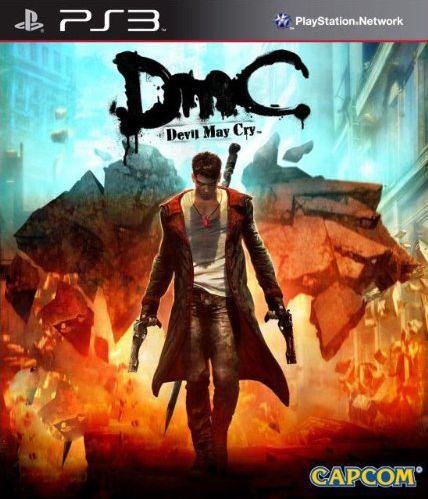
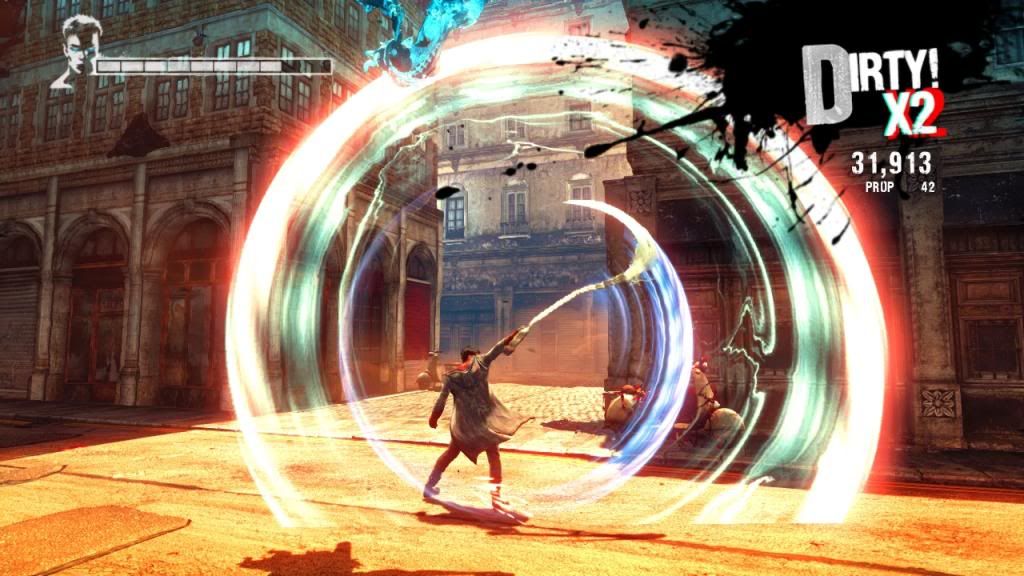
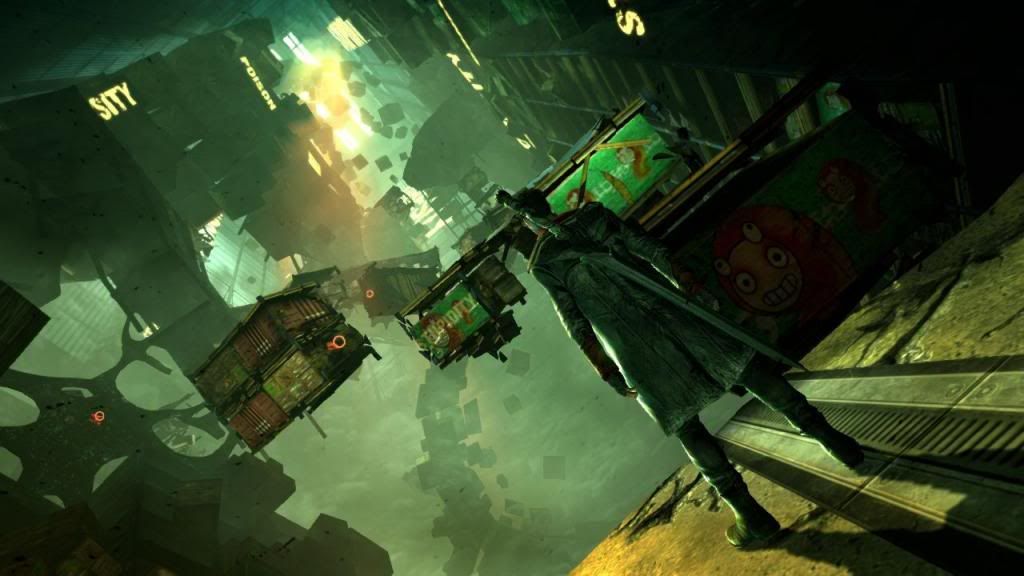
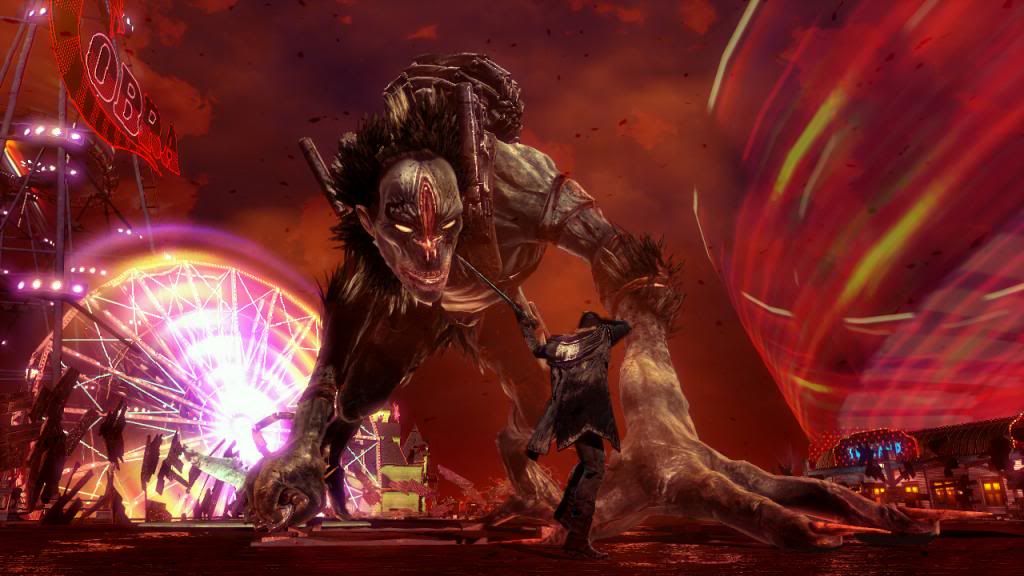
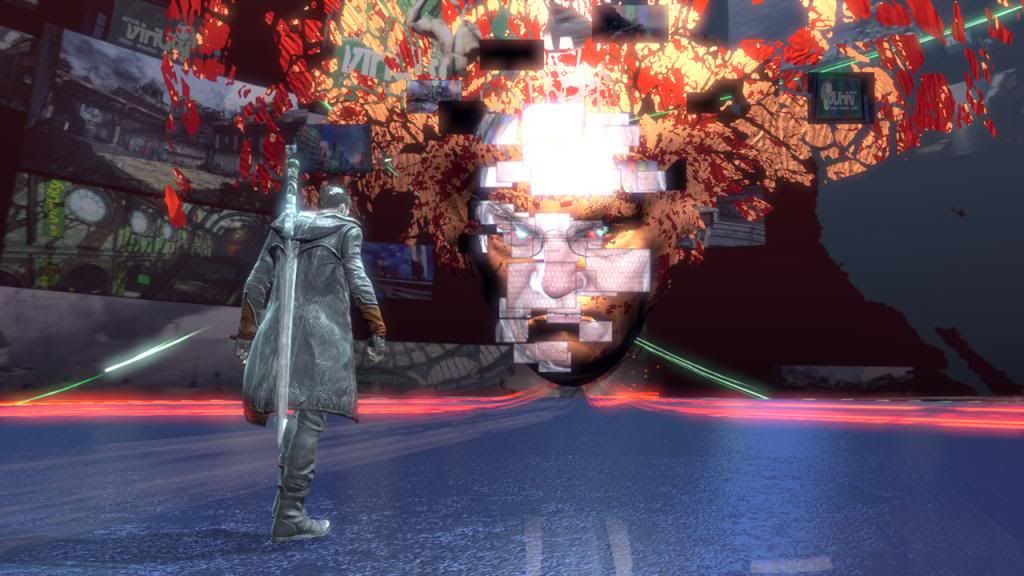

No comments:
Post a Comment